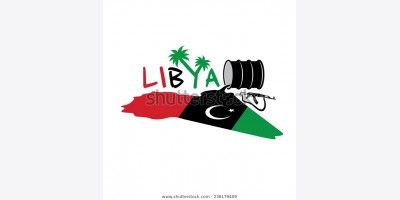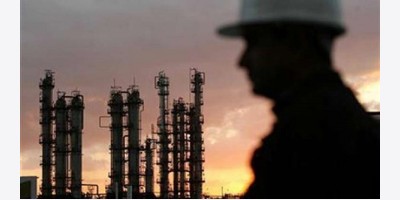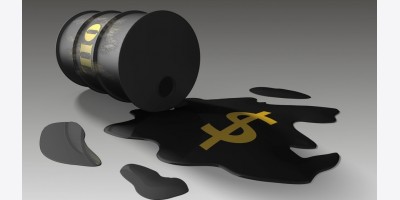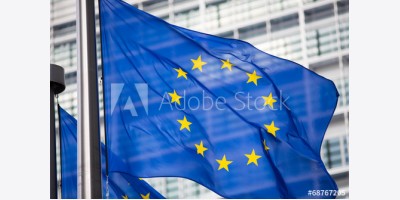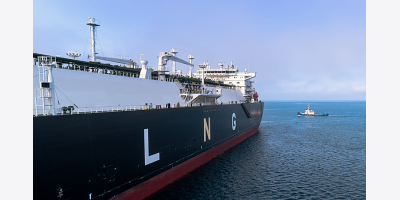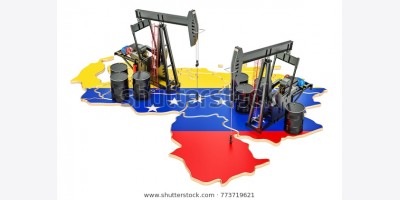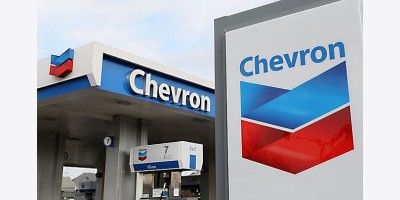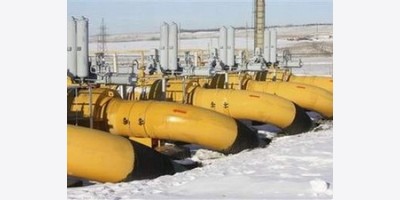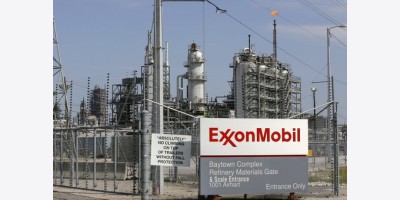By Grant Smith Jul 4, 2014 10:56 PM GMT+0700

The U.S. will remain the world’s biggest oil producer this year after overtaking Saudi Arabia and Russia as extraction of energy from shale rock spurs the nation’s economic recovery, Bank of America Corp. said.
U.S. production of crude oil, along with liquids separated from natural gas, surpassed all other countries this year with daily output exceeding 11 million barrels in the first quarter, the bank said in a report today. The country became the world’s largest natural gas producer in 2010. The International Energy Agency said in June that the U.S. was the biggest producer of oil and natural gas liquids.
“The U.S. increase in supply is a very meaningful chunk of oil,” Francisco Blanch, the bank’s head of commodities research, said by phone from New York. “The shale boom is playing a key role in the U.S. recovery. If the U.S. didn’t have this energy supply, prices at the pump would be completely unaffordable.”
Oil extraction is soaring at shale formations in Texas and North Dakota as companies split rocks using high-pressure liquid, a process known as hydraulic fracturing, or fracking. The surge in supply combined with restrictions on exporting crude is curbing the price of West Texas Intermediate, America’s oil benchmark. The U.S., the world’s largest oil consumer, still imported an average of 7.5 million barrels a day of crude in April, according to the Department of Energy’s statistical arm.
Surpassing Saudi
U.S. oil output will surge to 13.1 million barrels a day in 2019 and plateau thereafter, according to the IEA, a Paris-based adviser to 29 nations. The country will lose its top-producer ranking at the start of the 2030s, the agency said in its World Energy Outlook in November.
“It’s very likely the U.S. stays as No. 1 producer for the rest of the year” as output is set to increase in the second half, Blanch said. Production growth outside the U.S. has been lower than the bank anticipated, keeping global oil prices high, he said.
Partly as a result of the shale boom, WTI futures on the New York Mercantile Exchange remain at a discount of about $7 a barrel to their European counterpart, the Brent contract on ICE Futures Europe’s London-based exchange. WTI was at $103.74 a barrel as of 4:13 p.m. London time.
Islamist Insurgency
“The shale production story is bigger than Iraqi production, but it hasn’t made the impact on prices you would expect,” said Blanch. “Typically such a large energy supply growth should bring prices lower, but in fact we’re not seeing that because the whole geopolitical situation outside the U.S. is dreadful.”
Territorial gains in northern Iraq by a group calling itself the Islamic State has spurred concerns that oil flows could be disrupted in the second-largest producer in the Organization of Petroleum Exporting Countries after Saudi Arabia. Exports from Libya have been reduced by protests, while Nigeria’s production is crimped by oil theft and sabotage.
Libya will resume exports as soon as possible from two oil ports in the country’s east after taking back control from rebels who blocked crude shipments for the past year, Mohamed Elharari, spokesman for the state-run National Oil Corp., said by phone yesterday from Tripoli.
The U.S. will consolidate its position as the world’s biggest producer in the coming months if returning Libyan supply limits the need for Saudi barrels, said Julian Lee, an oil strategist who writes for Bloomberg News First Word. The observations he makes are his own.
Record Investment
“There’s a very strong linkage between oil production growth, economic growth and wage growth across a range of U.S. states,” Blanch said. Annual investment in oil and gas in the country is at a record $200 billion, reaching 20 percent of the country’s total private fixed-structure spending for the first time, he said.
A U.S. Commerce Department decision to allow the overseas shipment of processed ultra-light oil called condensate has fanned speculation the nation may ease its four-decade ban on most crude exports. Pioneer Natural Resources Co. and Enterprise Products Partners LP will be allowed to export condensate, provided it is first subject to preliminary distillation, the companies said June 25.
The decision was “a positive first step” to dispersing the build-up of crude supply in North America, Bank of America said in a report on June 27. The U.S. could potentially have daily exports of 1 million barrels of crude, including 300,000 of condensate, by the end of the year, according to a June 25 report from Citigroup Inc.
To contact the reporter on this story: Grant Smith in London at gsmith52@bloomberg.net
To contact the editors responsible for this story: Alaric Nightingale at anightingal1@bloomberg.net James Herron, Randall Hackley
By Stefan Nicola and Birgit Jennen Jul 4, 2014 8:00 PM GMT+0700
Germany plans to adopt regulation that will rule out shale fracking for the foreseeable future.
The government wants to ban hydraulic fracturing in shale rocks and coal beds at depths less than 3 kilometers (1.8 miles) and prohibit all types of fracking in water protection areas, Economy Minister Sigmar Gabriel and Environment Minister Barbara Hendricks said today. The government will start drafting legislation and seek to adopt it in the second half, Hendricks told reporters today in Berlin. The rules will be re-evaluated in 2021.
Fracking is unpopular in Germany even as Chancellor Angela Merkel’s government is keen to develop domestic energy sources as it closes nuclear plants by 2022. While companies including Exxon Mobil Corp. have drilled test wells into unconventional gas reservoirs in Germany to emulate the U.S. shale-gas boom, little headway has been made because of public opposition.
The new rules, if adopted, would be “the strictest that ever existed in this respect,” the ministers said in a joint letter to the Social Democrats. “Fracking for shale and coal bed gas for economic reasons won’t be possible in Germany for the foreseeable future.”
Fracking for tight gas, which has been done in Germany since the 1960s, will remain allowed under stricter conditions for frack fluids, the ministers said. Fracking will be allowed for scientific purposes if the fluids aren’t harmful to water supplies, it said.
Not Far Enough
The rules don’t go far enough and leave “loopholes” to allow fracking at a later stage, said Julia Verlinden, energy spokeswoman for the opposition Green Party.
“If you want to prevent fracking, you don’t need science projects,” she said today in an e-mailed statement. “The risk to harm our ground and drinking water supplies with fracking doesn’t justify the short-term drilling for comparably little gas.”
Europe is divided into different camps on fracking, which involves drilling hundreds of wells and cracking rocks with a high-pressure mixture of water, sand and chemicals to unlock gas or oil from impermeable stone. It’s backed by nations including the U.K., Poland and Spain and opposed in countries such as France and Germany.
The oil and gas industry says fracking should be at least tested to keep the door open to a technology that may redraw the energy map across Europe by reducing reliance on Russia. Germany has shale gas reserves for about 10 years of full supply and “maybe much more than that,” Kurt Bock, the chief executive officer of the world’s biggest chemical maker BASF SE, said yesterday at a conference in Berlin.
To contact the reporters on this story: Stefan Nicola in Berlin at snicola2@bloomberg.net; Birgit Jennen in Berlin at bjennen1@bloomberg.net
To contact the editors responsible for this story: Reed Landberg at landberg@bloomberg.net Indranil Ghosh, Ana Monteiro
Total SA (FP) Chief Executive Christophe de Margerie said he sees no reason for oil purchases to be made in dollars, adding that it makes sense to expand the use of other currencies in transactions outside the U.S.
“Nothing prevents anyone from paying for oil in euros,” de Margerie told journalists at the Cercle des Economistes conference in Aix-en-Provence, France. “The price of a barrel of oil is quoted in dollars. A refinery can take that price and using the euro-dollar exchange rate on any given day, agree to make the payment in euros.”
The remarks from the head of France’s largest oil company are the latest in a debate sparked by an $8.97 billion fine slapped by the U.S. on French bank BNP Paribas SA (BNP) for transactions carried out in dollars in countries facing American sanctions.
French Finance Minister Michel Sapin said this week that the BNP fine raises questions about the reach of U.S. laws because the bank’s transactions were not illegal in Europe. Sapin said European countries should look for ways to use the euro more frequently and that he will raise the matter with fellow euro-area finance ministers when they meet in Brussels on July 7.
“Shouldn’t the euro be more important in the global economy?” Sapin asked journalists in Paris July 3. “We have to consider the weight of the dollar and the consequences of pricing things in dollars when it means that American law applies outside the U.S.”
The remarks from Total SA's Christophe de Margerie, the head of France's largest oil... Read More
De Margerie said today that Sapin’s view is coherent.
“Yes it makes sense,” he said.
To contact the editor responsible for this story: Vidya Root at vroot@bloomberg.net
By Niklas Magnusson Jul 6, 2014 4:14 PM GMT+0700
Norway’s Industri Energi union and the oil and gas producer lobby reached an agreement on pay, averting a strike at companies including Halliburton Co. (HAL), Schlumberger Ltd. (SLB) and Baker Hughes Inc. (BHI)
The deal, negotiated with the Norwegian Oil and Gas Association overnight, includes increasing the compensation for Industri Energi 6,700 members working in the oil services industry by 24,000 kroner ($3,877) by Jan. 1, Industri Energi and the producer lobby said in separate statements on their websites today. The union will now ask its members to approve the terms, it said.
A failure to reach an agreement would have resulted in a strike by 78 Industri Energi members working at oil-service companies, which deliver services and products ranging from well maintenance to engineering. Today’s settlement follows both Industri Energi and the Norwegian Union of Energy Workers Safe breaking off talks in May, opting instead for mediation at a later date. Safe will discuss the same agreement on Aug. 15-16.
“We have stretched ourselves as far as we could in the mediation and now hope that Industri Energi’s members approve the mediation solution,” Jan Hodneland, the chief negotiator for Norwegian Oil and Gas, said in a statement.
To contact the reporter on this story: Niklas Magnusson in Stockholm at nmagnusson1@bloomberg.net
To contact the editors responsible for this story: Tasneem Hanfi Brogger at tbrogger@bloomberg.net Zoe Schneeweiss, Andrew Langley
By Tarek El-Tablawy and Salma El Wardany Jul 6, 2014 5:14 PM GMT+0700
Egyptians braced for what many expected to be steep increases in prices of consumer goods after the government raised energy prices as much as 78 percent to pare a costly and often abused subsidy system.
Egypt’s premier, Ibrahim Mahlab, defended the price increases at a news conference yesterday, saying they were imperative to the government’s “war” on poverty and a way to achieve “justice” in a system that long benefited the wealthy at the expense of the poor. The increase could prove to be the first major test of whether President Abdel-Fattah El-Sisi secured a strong enough voter mandate to tackle an issue that successive governments had shied from, fearing a backlash.
A smattering of protests broke out after the announcement of measures that raised gasoline prices by as much as 78 percent. Dozens of drivers and passengers blocked the road in the middle-income Cairo neighborhood of Shoubra el-Kheima yesterday, the state-run Al-Ahram newspaper reported. In the upscale Maadi neighborhood, a taxi driver and a passenger had a fistfight over the fare, which the passenger said shot up 50 percent within 45 minutes.
“How is it that social justice always seems to mean that we, the poor, get short-changed,” taxi driver Mohamed Farid said, referring to the main declared aim of the 2011 uprising that ousted President Hosni Mubarak.
Shrugging his shoulders, he said there was little to do “but wait and see.” “What are we going to do?” he asked. “Keep overthrowing governments when they do something we don’t like?”
Follow-On Rises
Notices of other, secondary price increases followed swiftly. The head of the Cairo Chamber of Commerce’s poultry division said chicken prices will rise by 25 percent within days because of added transportation costs, Al-Ahram reported. Mini-bus and taxi fares were raised by about 13 percent, according to figures provided in state media.
The increase, which also affects other refined fuels including diesel and natural gas, was announced late on July 4 in the Official Gazette and implemented within hours. It was announced a day after the government raised electricity prices. The rises are likely to deepen the hardship of many Egyptians during the holy month of Ramadan, when food prices typically increase and this year is being further burdened by frequent power cuts.
Unsustainable Subsidies
Mahlab said Egypt had spent 687 billion pounds ($96 billion) on energy subsidies over the past decade. Money saved from energy subsidies will benefit other key services such as health and education, officials have said. The price increases will add 51 billion pounds to state coffers, Mahlab said.
El-Sisi’s government has said the subsidy system it inherited is unsustainable, especially if Egypt’s economy is to rebound from its slowest growth rate in two decades. Officials are looking to narrow the budget deficit to 10 percent of gross domestic product in the fiscal year that began July 1, from an expected 12 percent for the previous year.
El-Sisi has said Egyptians must be willing to make sacrifices and put the the nation’s interests before their own to help end more than three years of unrest since Mubarak’s ouster. He himself said he would only accept half his pay and would give away half of his wealth.
President’s Popularity
The increases may determine whether El-Sisi’s popularity, which surged after former President Mohamed Mursi was toppled a year ago, will be strong enough to allay likely anger. Both Mubarak, who ruled for three decades, and Mursi steered clear of sweeping energy price rises.
Under the new pricing, reported by the state-run Al-Ahram newspaper, 95-octane gasoline increased to 6.25 pounds per liter from 5.85 pounds and 80-octane, which many drivers favor, rose 78 percent to 1.60 pounds from from 0.9 pounds. Diesel fuel, used in trucks and minibuses, was raised 64 percent to 1.80 pounds from 1.10 pounds, according to the state-run Al-Ahram newspaper.
A smart-card system curbing access to fully subsidized fuels has been years in the making without full implementation.
The price increases will have an inflationary impact that “will probably have a negative impact on consumption in the short term,” Mohamed Abu Basha, a Cairo-based economist at EFG-Hermes Holdings SAE, said by phone. While consumers and businesses will have to absorb the shock in the short-term, the government is “paving the way for more fiscal sustainability and for putting the economy on a path toward recovery.”
Safety Net
While a major backlash isn’t likely, “the government still doesn’t have the required social safety net in place, which is of concern,” he added.
Subsidies, including those for energy products, consume about a quarter of state spending, while wages to public-sector employees swallow another quarter. Finance Minister Hani Kadry, who has said cuts in energy subsidies could save about 40 billion pounds this fiscal year, told the news conference with Mahlab that Egypt is paying 540 million pounds a day in interest on its debts. Even with the new pricing, it will pay about 350 million pounds, compared with public-sector salaries of 550 million pounds, he said.
People commuting to work in Cairo were caught by surprise when they noticed the increase in public transportation fares. Mohamed Abdel-Kader, who earns a monthly salary of 790 pounds, paid 3 pounds instead of 2.20 pounds to go to work in a minibus.
“I have to cut one of my family’s small expenditures,” he said. “What do you suggest? Cut food spending and leave my kids to die of hunger, or get them out of schools to save the money? Really, what am I going to do?”
To contact the reporters on this story: Tarek El-Tablawy in Cairo at teltablawy@bloomberg.net; Salma El Wardany in Cairo at selwardany@bloomberg.net
To contact the editors responsible for this story: Tarek El-Tablawy at teltablawy@bloomberg.net Amy Teibel, Zoe Schneeweiss
France Says Boosting Use of Euro Is Issue of ‘Global Balance’
By Mark Deen and Caroline Connan Jul 6, 2014 5:25 PM GMT+0700
French Finance Minister Michel Sapin said euro area governments need to look at ways of bolstering the use of the euro in international transactions as a matter of “global balance.”
The remarks come a week after Paris-based bank BNP Paribas (BNP) SA was slapped with a $8.97 billion fine by U.S. authorities for transactions carried out in dollars in countries facing American sanctions. The fine spurred debate in France about the right of the U.S. in extending its regulatory reach beyond its borders.
“This is not a fight against dollar imperialism,” Sapin said in an interview with Bloomberg Television in Aix-en-Provence, France. “We sell ourselves aircraft in dollars. Is that really necessary? I don’t think so.”
Euro area finance ministers will discuss ways of increasing the use of the euro tomorrow in Brussels, Sapin said. The French finance minister received support from Christophe de Margerie, head of French oil company Total SA (FP), who said yesterday that he sees no reason for oil purchases to be made in dollars, adding that it makes sense to expand the use of other currencies in transactions outside the U.S.
“Nothing prevents anyone from paying for oil in euros,” de Margerie said in Aix-en-Provence. “The price of a barrel of oil is quoted in dollars. A refinery can take that price and using the euro-dollar exchange rate on any given day, agree to make the payment in euros.”
To contact the reporters on this story: Mark Deen in Paris at markdeen@bloomberg.net; Caroline Connan in London at cconnan@bloomberg.net
To contact the editors responsible for this story: Craig Stirling at cstirling1@bloomberg.net Vidya Root
By Tarek El-Tablawy and Salma El Wardany Jul 7, 2014 4:00 AM GMT+0700
Egypt’s president defended his decision to raise energy prices as the only way to save the nation from “drowning in debt,” as Egyptians braced for a jump in the cost of other consumer goods.
The increases of as much as 78 percent in fuel prices, announced July 4, were an “important step” that has been delayed for 50 years, Abdel-Fattah El-Sisi told the heads of national news outlets, according to the state-run Middle East News Agency.
Under ousted presidents Hosni Mubarak and Mohamed Mursi, Egyptian governments steered clear of major changes to subsidies for energy and other goods, with public opposition surfacing when such measures were even discussed. For El-Sisi, the former army chief who ousted Mursi last year and was elected to the presidency in May in a vote boycotted by many groups, the price increase may be an early test of support.
A smattering of protests broke out after the announcement. Dozens of drivers and passengers blocked the road in the middle-income Cairo neighborhood of Shoubra el-Kheima, the state-run Al-Ahram newspaper reported.
“How is it that social justice always seems to mean that we, the poor, get short-changed,” taxi driver Mohamed Farid said, though he saw no remedy. “What are we going to do?” he asked. “Keep overthrowing governments when they do something we don’t like?”
Budget Savings
El-Sisi has vowed to repair an economy growing at the slowest pace in two decades, and called on Egyptians to make sacrifices, saying he’ll accept only half his own pay. The government spends about 25 percent of the budget on subsidies, and is seeking to narrow a deficit that has exceeded 10 percent of economic output. The inflation rate was 8.2 percent in May.
Yields on nine-month government debt sold at an auction yesterday rose 16 basis points to 11.1 percent. The benchmark stock index, which has gained more than 60 percent since El-Sisi led the army takeover, added 0.8 percent.
Prime Minister Ibrahim Mahlab told a press conference on July 5 that Egypt spent 687 billion pounds ($96 billion) on energy subsidies over the past decade, and will save 51 billion pounds from the new measures. Officials say that services such as health and education will benefit.
Safety Net
Under the new pricing, 95-octane gasoline increased to 6.25 pounds a liter from 5.85 pounds, while 80-octane, which many drivers favor, rose 78 percent to 1.60 pounds. Diesel, used in trucks and minibuses, was raised 64 percent to 1.80 pounds, according to the state-run Al-Ahram newspaper.
El-Sisi also raised taxes on alcohol and cigarettes, according to MENA.
The price increases “will probably have a negative impact on consumption in the short term,” Mohamed Abu Basha, a Cairo-based economist at EFG-Hermes Holdings SAE, said by phone. He said the government is “paving the way for more fiscal sustainability and for putting the economy on a path toward recovery.”
While a major backlash isn’t likely, “the government still doesn’t have the required social safety net in place, which is of concern,” Abu Basha said.
Supporters of Mursi, who denounce his removal as a coup, said in an e-mailed statement that the price increases are a “deliberate collective punishment of the people.” El-Sisi told the newspaper chiefs that a “terrorist group” was using the new measures to disrupt efforts to mend the economy, MENA said. The government has declared Mursi’s Muslim Brotherhood a terrorist organization.
Commuter Shock
The fuel measures came a day after an increase in electricity prices, and are set to trigger secondary rises in other goods. The head of the Cairo Chamber of Commerce’s poultry division said chicken prices will rise by 25 percent within days because of added transportation costs, Al-Ahram reported. Mini-bus and taxi fares were raised by about 13 percent, according to state media.
Cairo commuters were caught by surprise. Mohamed Abdel-Kader, who earns a monthly salary of 790 pounds, paid 3 pounds instead of 2.20 pounds to go to work in a minibus.
“I have to cut one of my family’s small expenditures,” he said. “What do you suggest? Cut food spending and leave my kids to die of hunger, or get them out of schools to save the money? Really, what am I going to do?”
To contact the reporters on this story: Tarek El-Tablawy in Cairo at teltablawy@bloomberg.net; Salma El Wardany in Cairo at selwardany@bloomberg.net
To contact the editors responsible for this story: Alaa Shahine at asalha@bloomberg.net Amy Teibel, Ben Holland
Russia Cuts Gazprom Dividend Forecast as Pipeline Spending Rises
By Evgenia Pismennaya and Elena Mazneva Jul 7, 2014 3:00 AM GMT+0700
OAO Gazprom, Russia’s state-run gas producer, will pay a lower dividend than expected in 2016 as investments in export pipelines soar, according to a document prepared for a government meeting last week.
The Finance Ministry expects to receive 84.4 billion ($2.5 billion) from Gazprom dividends in 2016, 32 percent less than an earlier forecast of 124.7 billion rubles, according to the document, obtained by Bloomberg News. The new figure equates to 9.3 rubles per share, data compiled by Bloomberg show.
The government’s lower forecast for dividends may reflect Gazprom’s investment plans. The world’s largest gas exporter decided in May to spend $55 billion in next decade to build a gas pipeline to China and develop East Siberian fields. It must also finance the $22 billion South Stream pipeline project to the European Union.
The state expects to receive 68.8 billion rubles from its share in Moscow-based Gazprom in 2015, unchanged from an earlier forecast, Russia’s Finance Ministry said in the document. That equates to a 5 percent increase from this year and equals about 7.6 rubles a share, according to data compiled by Bloomberg.
Payments to the budget in 2017 are estimated at 92.9 billion rubles, the ministry said, equal to 10.2 rubles per share.
The ministry used profits estimated under Russian accounting standards when calculating some of the state companies’ dividends, a government official said, asking not to be identified because the information isn’t public. The payout percentage was also reduced, with almost all of the calculations based on payments of 25 percent of profit under Russian standards, he said.
State-backed companies were due to pay at least 35 percent of profit under international accounting standards from 2016 to boost payments to the budget, the Finance Ministry said last year. Russia’s Economy Ministry in May this year opposed the measure.
Russia may drop the plan for Gazprom, said Yulia Bushueva, a managing director at Arbat Capital in Moscow. If there is a need to boost budget income, the government may introduce new taxes rather than sharing more profit with Gazprom’s minority shareholders, she said.
Gazprom has 23.7 billion shares outstanding and 38.4 percent is owned directly by the government. The company’s profit to Russian standards was 628 billion rubles last year versus to 1.139 trillion rubles to international standards.
Gazprom spokesman Igor Volobuev declined to comment saying that questions on state forecasts refers to the Finance Ministry. Finance Ministry spokeswoman Svetlana Nikitina didn’t respond to calls, e-mail requesting comment outside of regular business hours.
To contact the reporters on this story: Evgenia Pismennaya in Moscow at epismennaya@bloomberg.net; Elena Mazneva in Moscow at emazneva@bloomberg.net
To contact the editors responsible for this story: Will Kennedy at wkennedy3@bloomberg.net Tony Barrett
Tripoli - Libya has lifted force majeure from the Ras Lanuf and Es Sider oil ports at 15:00 local time, paving the way for exports to resume, a spokesperson for National Oil Corp (NOC) said on Sunday.
A group of rebels ended an almost year-long blockage of the two eastern export terminals last week.
Last week, rebels agreed to allow the resumption of oil exports from the two major ports, ending an almost year-long blockade to press financial and political demands.
The port reopening would restore part of oil output fallen to a trickle of the 1.4 million barrels a day the OPEC member used to pump last summer when a wave of protests started.
The state oil firm had declared force majeure, a waiver of contractual obligations, when the rebels seized the ports last year.
Ali Al-Ahrash, commander of the state Petroleum Facilities Guards (PFG) in charge of protecting oil facilities, said the ports were ready to resume exports.
"The situation at the two ports is safe and the National Oil Corp can resume work at Ras Lanuf and Es Sider," he told Reuters. "We officially notified them about this." Under Libyan rules the PFG force needs to notify NOC by letter that the ports are under full government control before exports can resume.
Disputes over Libya's vast oil resources have been among the many triggers for conflict between rival brigades of former rebels and allied political factions since civil war ended four decades of Muammar Gaddafi one-man rule in 2011. Port rebel leader Ibrahim Jathran had agreed in April to reopen two smaller eastern ports, Zueitina and Hariga, and then gradually free up Es Sider and Ras Lanuf.
After that deal, shipments from Zueitina were delayed because of damage from the blockade, while Hariga has seen only a few tanker loadings, hampered by a separate protest temporarily closing the port again.

OMV (Norge) AS, operator of production licence 537, has made an oil discovry northwest of the "Wisting Central" oil discovery in the Barents Sea, the Norwegian Petroleum Directorate reports. The primary exploration target for the well was to prove petroleum in Middle Jurassic to Late Triassic reservoir rocks (Stø, Nordmela and Fruholmen formations). The secondary exploration target was to prove petroleum in Late to Middle Triassic reservoir rocks (Snadd formation).

The well encountered an oil column of about 20 metres in the Stø formation, with very good reservoir properties.
Mainly gas was encountered in sandstone layers in the Snadd formation with poor reservoir properties, and no gas gradient was established.
Preliminary calculations of the size of the discovery are between three and eight million standard cubic metres (Sm3) of recoverable oil.
A successful formation test was carried out in the Stø formation. The maximum production rate was 319 Sm3 oil and 9195 Sm3 associated gas per flow day through a 56/64-inch nozzle opening.
The well, locaated 315 kilometres north of Hammerfest, was drilled to a vertical depth of 1679 metres below the sea surface and terminated in the Snadd formation from the Late to Middle Triassic Age. The water depth is 418 metres.
OMV (Norge) AS as operator has a 25% share in the license; their joint venture partners are Petoro, Idemitsu, Tullow (each 20%) and Statoil (15%).
(Aftenposten/Press release)
Yemen's income from oil exports tumbled by over 64 percent to $73.4 million in May from a year ago, due to attacks on an export pipeline, and the central bank's foreign asset reserves shrank to their lowest since end-2011, data showed on Sunday.
Sanaa's finances have deteriorated as it has been caught in a nationwide fight against al Qaeda militants and other rebel groups. It has suffered power cuts and petrol shortages with the government struggling to pay public sector salaries and finance food and energy imports.
It relies on crude oil exports to finance up to 70 percent of its budget.
Sanaa has earned just $671 million from exporting its crude in January-May, nearly 40 percent less than in the same period last year, the central bank's monthly report showed.
As a result, the central bank's gross foreign asset reserves slipped for a sixth month in a row to $4.6 billion in May from $4.7 billion in April, reflecting the state's failure to secure oil pipelines against bombings.
That level is enough to secure 4.4 months of imports but bellow 7.6 months on average Yemen recorded in 2007-2013.
When deducting liabilities, which include Saudi Arabia's $1 billion deposit from 2012, the central bank's reserve cushion is much lower, at $3.3 billion in May. Overall, Yemen's banking system held $5.6 billion in net foreign assets in May.
Financial aid from abroad, which has been slow to arrive, has become a lifeline for Yemen, the second-poorest Arab nation after Mauritania. Sanaa is hoping to seal a long-discussed $550 million loan from the International Monetary Fund this year that could help unlock more donor funds.
The IMF expected in April Yemen's budget deficit to shrink to 6.7 percent of gross domestic product this year from 7.1 percent in 2013, which was the biggest shortfall since 2009.
Inflation eased to an annual 7.4 percent in April from this year's peak of 7.6 percent in the previous month, as growth in prices of food and non-alcoholic beverages cooled slightly, the central bank's report also showed.
Core inflation, which excludes volatile prices of food, tobacco and qat leaf, remained at 10.7 percent in April for the second month in a row, the highest level since August 2012. That seems to rule out further monetary policy easing for now.
The central bank slashed its key rate by 5 percentage points from October 2012 to February 2013 to support economic recovery, bringing it to a three-year low of 15 percent. Headline inflation averaged 7.1 percent during this period and core inflation 7.3 percent.
Copyright Reuters, 2014

MOSCOW — Russia and Ukraine could continue gas talks on Tuesday, a spokesman for Russian exporter Gazprom said, adding that he hoped a mutually beneficial agreement would be found.
"Talks went for a long time yesterday... There is an understanding on how to move forward - this is very important," Sergei Kupriyanov told a briefing.
He added that Ukraine has now to repay debt of $1.45 billion for gas delivered in November and December last year.
Late on Monday, after some six hours of talks brokered by the European Commission, European Energy Commissioner Guenther Oettinger said the chief executives of Gazprom and Ukraine's Naftogaz had agreed to consider a plan that could avoid price disputes recurring over the European winter when demand peaks.
The Saudi Municipal and Rural Affairs Ministry has awarded ENOC the necessary certificate to operate in the Kingdom
Emirates National Oil Company (Enoc) said on Sunday it has been awarded the necessary certificate to manage, operate and maintain fuel service stations along Saudi Arabian highways and roads.
Enoc is one of three companies to win the qualification certification issued by the Saudi Municipal and Rural Affairs Ministry, it said in a statement.
“Enoc’s significant differential is the high standards we have set in fuel retailing and convenience stores that operate as part of the service station. This has enabled us to win the qualification certification and we are committed to deliver on the objectives outlined by the Ministry,” stated Burhan Al Hashemi, Managing Director of Enoc Retail.
Enoc recently opened its “first full-fledged service station” in Dammam, according to a company statement announcing the qualification.
According to Enoc, the new service station includes a ZOOM convenience store, Costa Cafe and Burger King. There is also a prayer room in the service station.
“The opening of our first service station in the Kingdom is a perfect fit to Enoc’s business diversification initiatives. The full spectrum of convenience retail and food & beverage outlets will be offered as part of the service station, which will further grow our Retail business. We thank the Government of Saudi Arabia for their support to this venture,” said Saeed Khoory, Chief Executive Officer of Enoc.
Gulf News





